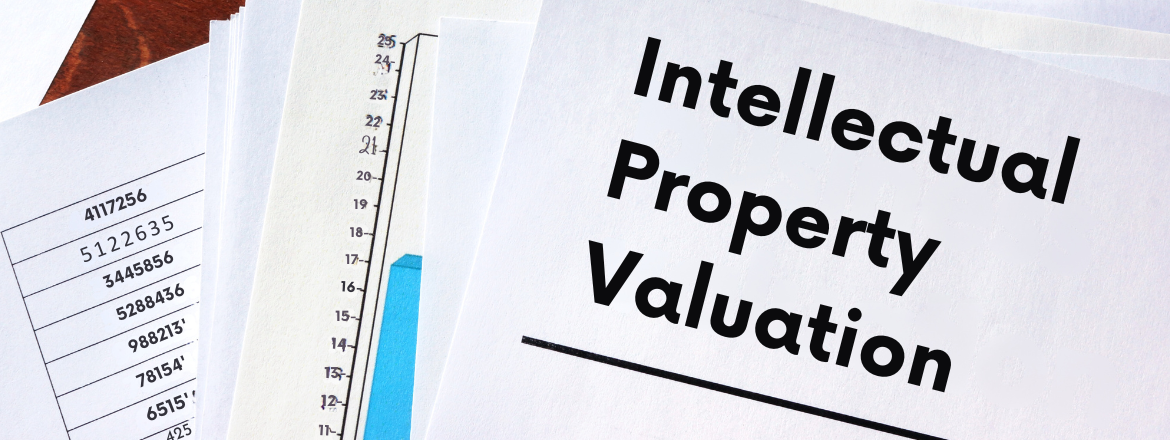Intellectual Property Valuation and Assessment

Table of Contents
What is IP Valuation
The process of gauging the monetary value of intangible assets is known as intellectual property valuation (IP Valuation). It represents a crux essential for participating in transactional activities, licensing agreements, or entering into commercial arrangements based on IP. Assigning a monetary value to these assets is complex, including multiple approaches closely linked to a wide range of potential use scenarios.
This article will delve into the intricacies of these methods, shedding light on the factors and tools employed in the valuation of intangible assets.
Background
Over time, Intellectual Property (IP) has firmly established itself as the fundamental foundation in virtually every business undertaking. It serves as the driving force behind the propulsion of exceptional and distinct ideas, fostering innovation within various industries.
The concept of assigning monetary value to intangible assets has become a critical component in the development of strategic and financial schemes. The gravitas of protecting these ethereal assets is shown by a long history of high-profile mergers, acquisitions, and assertive legal actions. These incorporeal assets undergo a legal process that grants them enforceability under the law and bestows upon them a distinctive identity.
Their recognition stems from their utility in facilitating high-value transactions and serving as a catalyst for innovation, breathing life into the economic lifespan of businesses. The gravity of this process is reflected in its role as a linchpin in the overall success and sustainability of enterprises.
Why IP Valuation
As previously stated, the justification for valuation arises from the imperative demands posed by numerous use scenarios, which include the ease of economic transactions and the commercialization of IP. Some of these scenarios are:
- Mergers and Acquisitions, Joint Venture, or Bankruptcy: Companies today rely largely on intangible assets like R&D and knowledge investments. As spending on intangibles rises, so does the proportion of intangible assets in a company's total value and market position.
- Technology Transfer: In IP transactions, organizations negotiating sales or licensing must agree on a price, emphasizing the need to understand the value of the IP property for a mutually beneficial agreement.
- Support in Situations of Conflict: In conflict situations, appropriately valuing the IP right is critical for guaranteeing equitable recovery for damages.
- Fundraising through Bank Loans or Venture Capital: Valuing IP for bank loans, venture capital, and investor interest is crucial. Possessing patents and implementing strong intellectual property management has a substantial impact on venture capitalist judgments.
- Assisting internal decision-making: Valuation influences judgments on elements such as protection measures, and country selection for IP registration. In addition, they can assist in detecting flaws like ownership uncertainty.
- Accounting and Taxation: Organizations must report on all assets, including intangibles, thus valuation is necessary for financial reporting and IP tax planning.
IP Valuation Assessment Prerequisites
To assess the value of an intellectual property (IP) asset, certain criteria must be satisfied:
- Distinct Identifiability: The asset must be distinguishable, subject to specific identification, and accompanied by a recognizable description.
- Tangible Evidence of Existence: Concrete proof of the asset's existence is crucial, whether in the form of a contract, license, registration document, or inclusion in financial statements.
- Temporal Creation: The asset should have a discernible point in time at which it was created.
- Legal Enforceability and Transferability: It must be legally enforceable and capable of being transferred from one entity to another.
- Isolated Income Stream: The income generated by the asset should be distinctly identifiable and separated from that of other business assets.
- Independent Saleability: The asset should be sellable independently, without reliance on other business assets.
- Susceptibility to Destruction or Termination: There should be an identifiable point in time at which the asset could face destruction or termination.


Factors Affecting IP Valuation
- Basis of Appraisal: The value of an intellectual property asset is intimately linked to the circumstances under which it is evaluated. For example, determining its value within a 'going concern' includes evaluating its functionality and activity, whereas, in a dormant state, the value may vary. Forced liquidation yields different valuations than orderly asset disposition, complicating problems even more.
- Value Standard: The accepted standard used to appraise the intellectual property asset has a considerable impact on the valuation outcome. Different standards, such as fair market value or replacement cost, can have varying results, stressing the significance of clarity in selecting the appropriate benchmark.
- Purpose of Valuation: Understanding the rationale for the valuation is critical. Whether it is for transactional objectives, financial reporting, strategic planning, or legal compliance, the intended application significantly impacts the valuation process and factors.
- Valuation Timing: Market fluctuations, technological improvements, and regulatory shifts can all impact the value of an intellectual property asset. A valuation undertaken at different moments in time may provide divergent conclusions.
- Accessibility and Reliability of Pertinent Data: Comprehensive and reliable information regarding market trends, competitive landscapes, and asset performance is required for a robust valuation process.
- Application of Valuation Method(s) and Assumptions: Whether using income-based, market-based, or cost-based techniques, transparent methodologies and sensible assumptions improve value credibility.
- Legal, Tax, Financial, or Business Circumstances: Legal constraints, tax implications, financial health, and overall business strategies must be considered to provide a comprehensive and accurate valuation.
- Characteristics, Extent, and Strength/Validity of the Underlying IP Asset: The nature, extent, and strength or validity of the underlying intellectual property asset all influence its value. Uniqueness, market demand, and legal protection all add to the asset's overall value.
- Concerns Related to Infringement or Freedom to Operate: Identifying potential legal challenges or limits can have an impact on the value of an intellectual property asset and the risk profile associated with its use.
IP Valuation Methodologies
Income Method: This method determines the asset's value based on the predicted economic revenue it is expected to create, adjusted for current value. This strategy is particularly appropriate for IP assets with positive cash flows, those with estimable future cash flows, and those that can be discounted using a risk proxy.
Market Method: This method compares the actual price paid for transferring similar intellectual property rights under comparable situations. Its simplicity and dependence on market data make it a popular choice for approximating values required to calculate royalty rates, tax considerations, and income method inputs.
Cost Method: This approach works by determining the cost of a comparable (or identical) IP asset. It is useful when an asset is easily replicated and the economic benefits cannot be quantified. Notably, this strategy ignores any distinctive or original qualities of the asset, as well as wasted expenses.
Conclusion
Measuring the value of your IP assets is a mandatory strategy that should be utilized in your business strategy. At Abou Naja, we guarantee that your intangible assets are not only safeguarded but also prosper in a changing market by skillfully assessing the complexities of intellectual property valuation. Let us walk you through the appraisal process, providing clarity on complex approaches. Whether it's cost, market, or income-based, we apply our experience to reveal the actual value of your IP. With Abou Naja Intellectual Property, where your intangible assets find their legal fortress, you may improve your strategic choices and safeguard your creativity. Drop us an email at [email protected] for a complimentary consultation.
Frequently Asked Question
What is Intellectual Property Valuation?
Intellectual Property Valuation is the process of determining the monetary value of intangible assets, playing a crucial role in transactions, licensing agreements, and commercial arrangements based on intellectual property.
Why is IP Valuation Important?
IP Valuation is essential for various scenarios, including mergers and acquisitions, technology transfers, conflict resolution, fundraising, internal decision-making, and accounting. It ensures equitable recovery, supports strategic decisions, and aids financial reporting.
What are the prerequisites for IP Valuation Assessment?
Prerequisites include distinct identifiability, tangible evidence of existence, temporal creation, legal enforceability and transferability, isolated income stream, independent saleability, and susceptibility to destruction or termination.
What factors affect IP Valuation?
Factors include the basis of appraisal, value standard, purpose of valuation, valuation timing, accessibility and reliability of data, application of valuation methods and assumptions, legal, tax, financial, or business circumstances, and characteristics of the underlying IP asset.
What are the IP Valuation Methodologies?
IP Valuation can be done using Income Method (based on predicted economic revenue), Market Method (comparing actual prices for similar rights), and Cost Method (determining the cost of a comparable IP asset).
Why is IP Valuation crucial for Businesses?
IP Valuation is crucial for strategic decision-making, financial reporting, compliance with legal requirements, and safeguarding creativity in a changing market.






